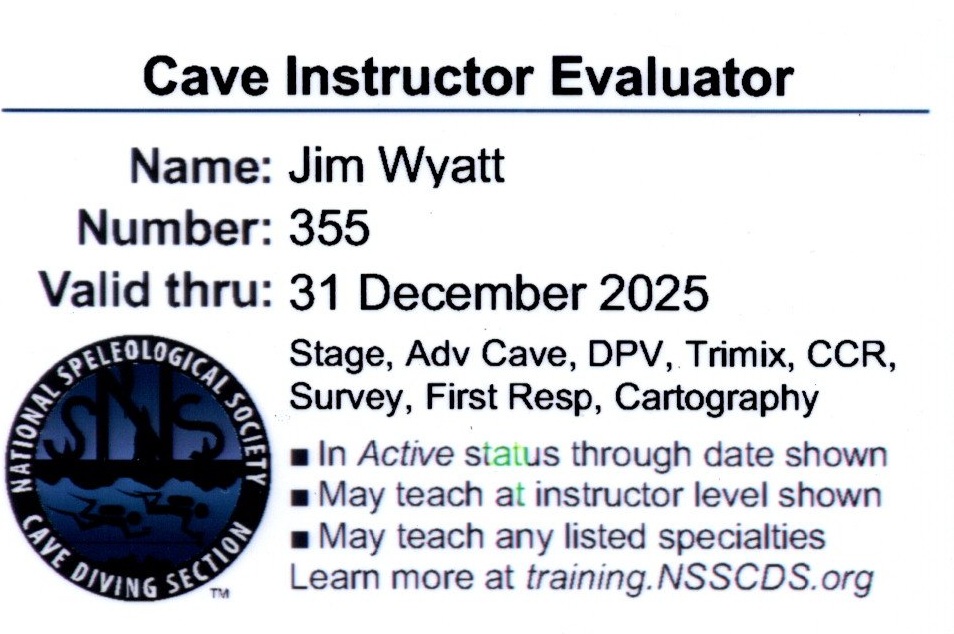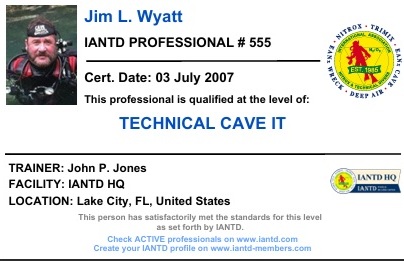


Follow this link and you can see an abbreviated list of the gear that you need to take the apprentice class, the cave class and others beyond cave.
No, the Cavern Course is not a prerequisite for the NSS-CDS Apprentice Cave Course, nor does it count toward certification for Apprentice Cave. However, the Apprentice course has all the coursework that the cavern course has, and more.
No, but you should strongly consider taking Advanced Nitrox along with Apprentice Cave.
In order to enroll in the NSS-CDS Apprentice Cave course students must have prior training or documented experience in back or sidemounted doubles and demonstrate mastery in buoyancy control, trim and propulsion for cave diving.
No, you can rent primary lights at the dive shop so you can gather more information and make an informed choice as to which primary light you want to own. These lights are expensive and there are a lot of variables in terms of burntime, lumens, how they are carried and battery types.
Yes, this is very personal gear and you must own your own to take my classes.
Consider this gear as primary life support way back in a cave. No one should consider renting this gear. Regulators need to be high performance and not the least expensive ones you can find, don't shop for a "bargain". Good brands are Dive-Rite, Apeks, Scubapro, Aqua-Lung Legend.
Yes.. I think Shearwater computers are the best suited for the type diving we will be doing. Predator, Petrel, Perdix or Teric.
Most, if not all recreational dive computers are unsuitable for the type diving we will be doing at the full cave level. If you have one bring it and use it in gauge mode only.
I suggest a dry-suit *IF* you have it under control, otherwise a 5-7 mil suit is OK. In the long term you should end up with a drysuit for cave diving, but learning to dive a dry suit during your cave class is not suggested.
You need redundant buoyancy...a drysuit will work but I suggest a dual bladder wing.
I suggest steel tanks, minimum LP 85's. Aluminum 80's may be used but this not an optimal way to approach cave diving in my opinion..
Little River, Devil's Eye, Devil's Ear, Ginnie Ballroom, Peacock, Madison Blue, Manatee
EAN32 for bottom gas and 100% Oxygen for decompression.
I suggest Rum Island. call me for reservations.
There are several choices. My primary cave agencie are NSS-CDS and IANTD. PADI Tec cave certs may also be issued.
We use the TDI or IANTD eLearning for the cave portion and TDI or IANTD Advanced Nitrox/Decompression Procedures eLearning programs for the tec side.
I also suggest you read Basic Cave Diving It is an old book from 1979 but many of the principles are still completely relevant today.
Most dive shops do not have a clue how to help you get the proper gear for cave diving. Contact me and I will make sure to steer you to the appropriate gear.Cave Gear you need
Cash or Venmo in full on day one of class.
My time, a student kit with a digital manual, and one cert card for each course you pass.
Lodging, meals, park entry fees, nitrox fills, oxygen fills, e-Learning modules, transportation, any equipment you may need to rent such as a primary light and tanks.
Some of the caves we will dive in are 100 feet deep, some 70 feet deep, and some are 50 feet deep.
Yes, we will dive in high and low/no flow caves. This provides you with a wide range of experience better preparing you for a greater variety of conditions.
No. Many of the passages we will dive in are large enough for a pickup truck to drive through, some are large enough for an 18-wheeler to drive through. A few places will be small but never so small that we have to remove equipment to get through.
Mostly 100 feet of visibility, rarely lower than 50 feet. Water temperatures vary from 68-72 degrees F.
Apprentice Cave requires a minimum of 8 dives with 240 minutes of bottom time.
Full Cave requires 8 additional dives and another 360 minutes of bottom time. These are the minimum requirements.
Generally we will begin our day at or around 8-9 AM. We will make one dive in the morning, break for lunch and have a 60-90 minute surface interval then make a second dive. We are generally done between 4 and 5 PM.
We will bring our lunch and two sets of tanks so we do not have to leave the dive site during the surface interval.




